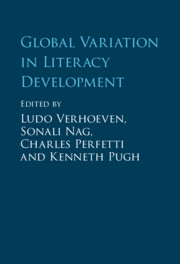Book contents
- Global Variation in Literacy Development
- Global Variation in Literacy Development
- Copyright page
- Contents
- Figures
- Tables
- Contributors
- Abbreviations
- 1 Introduction
- Part I Regional Variations
- 2 Sociocultural Variation in Literacy Development in Canada and the United States
- 3 Literacy Contexts and Literacy Development in South America
- 4 Postcolonial Literacy Development in the Caribbean
- 5 Literacy Development in Europe
- 6 Literacy Education and Development in Russia
- 7 Literacy Development and Language of Instruction in Sub-Saharan Africa
- 8 Literacy and Linguistic Diversity in Multilingual India
- 9 Literacy Development in East Asia
- 10 Literacy and Linguistic Diversity in Australia
- Part II Neurobiological and Ecological Markers
- Index
- References
4 - Postcolonial Literacy Development in the Caribbean
from Part I - Regional Variations
Published online by Cambridge University Press: 23 November 2023
- Global Variation in Literacy Development
- Global Variation in Literacy Development
- Copyright page
- Contents
- Figures
- Tables
- Contributors
- Abbreviations
- 1 Introduction
- Part I Regional Variations
- 2 Sociocultural Variation in Literacy Development in Canada and the United States
- 3 Literacy Contexts and Literacy Development in South America
- 4 Postcolonial Literacy Development in the Caribbean
- 5 Literacy Development in Europe
- 6 Literacy Education and Development in Russia
- 7 Literacy Development and Language of Instruction in Sub-Saharan Africa
- 8 Literacy and Linguistic Diversity in Multilingual India
- 9 Literacy Development in East Asia
- 10 Literacy and Linguistic Diversity in Australia
- Part II Neurobiological and Ecological Markers
- Index
- References
Summary
This chapter goes into the postcolonial development of literacy in the Caribbean. To begin with, the sociolinguistic background of language and literacy planning in native and (ex-)colonial languages across Caribbean nations is highlighted. Over the past century, a far-reaching process of decolonization has taken place in the Caribbean, a region of insular territories with mostly native Creole-speaking communities, in between North and South America. Special attention is given to the use of these languages in education and the effects on the actual attainment of literacy levels in native and colonial languages across Caribbean states. There is an additional focus on postcolonial literacy development in the Dutch Caribbean; this is an interesting case in which the Creole language Papiamentu has become highly valued in media, education, and other social domains, replacing Dutch. The focus is on the gradual implementation of Papiamentu literacy in the curriculum, and the literacy levels in native Papiamentu and Dutch as a (foreign) colonial language throughout the primary grades, and their relations with school success. Finally, a future perspective on postcolonial literacy development in the Caribbean is provided.
- Type
- Chapter
- Information
- Global Variation in Literacy Development , pp. 70 - 89Publisher: Cambridge University PressPrint publication year: 2023

